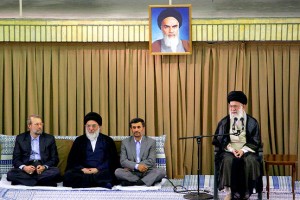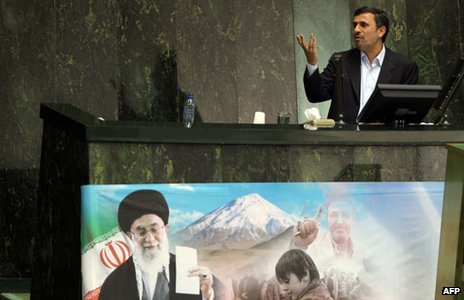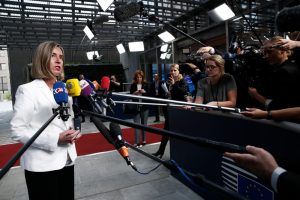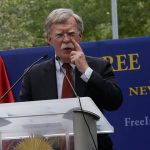 The escalating sanctions regime that has been imposed on Iran by the United States and European Union has placed all parties involved in a rather strange position. On the US side, the palpable glee over the dropping value of the Iranian currency and the success sanctions have had in causing misery has been hard to hide. It is also politically astute for domestic electoral purposes to take credit for the success of sanctions. That is why State Department spokeswoman Victoria Nuland simply couldn’t resist giving quite a bit of credit to the sanctions regime in the immediate aftermath of the currency devaluation in Iran:
The escalating sanctions regime that has been imposed on Iran by the United States and European Union has placed all parties involved in a rather strange position. On the US side, the palpable glee over the dropping value of the Iranian currency and the success sanctions have had in causing misery has been hard to hide. It is also politically astute for domestic electoral purposes to take credit for the success of sanctions. That is why State Department spokeswoman Victoria Nuland simply couldn’t resist giving quite a bit of credit to the sanctions regime in the immediate aftermath of the currency devaluation in Iran:
Our understanding is that the Iranian currency has dropped to a historic low today against the dollar in informal currency trading, this despite some frantic efforts by the Iranian government last week to try to prop it up, rearrange the way it dealt with these issues…..From our perspective, this speaks to the unrelenting and increasingly successful international pressure that we are all bringing to bear on the Iranian economy. It is under incredible strain. Iran is increasingly cut off from the global financial system.
Yet it is not particularly seemly or civilized to take too much credit for causing misery in front of a global audience. That’s why Obama Administration officials twist and turn to explain that while sanctions are the mark of the administration’s great success, it is the Iranian government that is responsible for the deteriorating state of Iran’s economy. In the words of White House spokesman Jay Carney:
Iran’s leaders have made conscious choices about how they manage their economy, how they prioritize their budget and how they respond to the concerns of their people. The regime has chosen to spend money to pursue nuclear activities in violation of its international obligations, to support Bashar al-Assad’s brutal regime, to enable terrorist acts around the world, and to undertake destabilizing activities around the region.
The chosen examples of mismanagement is telling. Somehow we are expected to believe that the Iranian economy is in significantly worse shape than it was, let’s say, two years ago because of military and nuclear-related spending which I doubt constitutes even 1 percent of the country’s gross domestic product. (The latest figure that the Stockholm Institute for Peace Research has for Iran’s total military spending as a percentage of Gross National Product is 2 percent for 2008 while the CIA fact book puts the 2006 percentage at 2.5 percent. That’s a significantly lower percentage than neighboring countries like Turkey, Saudi Arabia and of course the United States, which, given its vast military presence in the region, is effectively Iran’s neighbor).
But US government officials are not the only ones caught in a delicate situation regarding the impact of sanctions, trying as they are to balance their jovial sense of success for the imposed policy of collective punishment and their avowed care for the “freedom loving people” of Iran. The EU foreign ministers’ statement on the latest sanctions slaps more broad punishment against the whole country while attempting to protect its writers from a guilty conscious. They want the world to remember that the innocuously worded “restrictive measures” are not aimed at the Iranian people but only “at affecting Iran’s nuclear program and revenues of the Iranian regime used to fund the program.”
The conversation regarding the impact of sanctions is as surreal and even more politicized inside Iran. President Mahmoud Ahmadinejad, after years of describing sanctions as worthless pieces of torn paper but also a source of native talents’ great advancement, has suddenly found vested interest in identifying sanctions as the source of all the country’s economic woes.
It is not his fault and if you don’t believe him he is now more than willing to hand in his resignation letter, he tells a somewhat stunned audience of Iranian politicos, in a press conference last week. Just like that, with a shrug and annoying smirk, presumably assured that none of his political opponents has the energy to get too riled up about the wreckage he has made of the Iranian political and economic landscape.
Still, his conservative opponents do try to score a point by arguing otherwise. Iran’s presidential election is coming up in June 2013 and no one can afford to be associated with the policies of the past few years. These conservative opponents do not deny the impact of sanctions but see the source of the problem in Ahmadinejad’s populist and expansionary economic policies in the face of a tightening sanctions regime that he refused to take seriously and is now unable to address adequately because of the incompetence of his economic team. Their own complicity in the creation of this wreckage is of course a topic to be ignored.
Standing on top of this cantankerous conversation is Leader Ali Khamenei whose attempt to walk a tightrope in a series of speeches to various audiences in the North Khorasan Province last week was truly a spectacle. On one hand, he has been careful not to blame the sanctions too much. He is, after all, Iran’s “decider” and the person in charge of the “general direction of the country.” All along his talking point has been that Iran’s defying stance against external bullying is actually good for the country’s blossoming talent. Iran’s “resistant economy” is his brainchild.
In North Khorasan, Khamenei again reiterated his view that the sanctions regime is not about Iran’s nuclear program and is about Iran giving in to the dictates of US hegemony. The US “does not want Iran to come back to the negotiating table; it wants Iran to surrender to Western bullying during negotiation,” he said. Rightly or wrongly, it is this rather dark view of US intentions that prevents Khamenei from blaming sanctions. Iran’s defiant posture relies on the denial of the severe impact of the sanctions regime.
But Khamenei cannot go too far in blaming government policies and general incompetence for Iran’s current economic woes either. His continued support for the Ahmadinejad government is the only thing left between the latter and a testy and worried conservative political class ready to impeach the president for incompetence along with, as I mentioned above, the hope of ridding itself of the charge of complicity in bringing about Iran’s current economic problems.
In the mind of the influential conservative MP, Ahmad Tavakoli, “Ahamdinejad’s period is over and the continuation of his presidency is not positive” but a “consensus” regarding this issue has not yet developed. When asked whether this is due to the fact that some people — read Khamenei — would like to keep the country calm in the 9 months that are left in Ahmadinejad’s presidency, Tavakoli answers in the affirmative and emphatically rejects rumors that Khamenei’s circumspection is because “Ahmadinejad and his team has threatened the Leadership.” He says that it can be accepted that at this time “tranquility is a value and losing it is considered a loss of value but the conclusion will not always be this.” In fact, Tavakoli goes on to make clear that he disagrees with Khamenei’s decision to tolerate Ahmadinejad until the end of his term for the sake of political tranquility.
There are others who seem to agree. Last week, over 100 MPs once again signed on to a question from the president regarding the currency situation. If Khamenei doesn’t put a stop to this process – and he probably will – Ahmadinejad will be hauled to the Parliament for a second time this year. Given the rule changes put in place after his last showing, if the Parliament is not satisfied with his answer, a vote will have to be taken regarding whether to lodge a complaint against him in the Judiciary.
The likelihood of this happening is low but I guess it is important to note that even if the Iranian economy is imploding and on the verge of collapse as some western officials claim, the politics of bickering continues to rule supreme even in Iran and is bound to get worse with the nearing of the election season despite Khamanei’s repeated calls for calm and not treating competitors as enemies.






It seems to me noteworthy that the attack on Iran using the international banking system was conveniently preceded by removal of Khadafi and his proposed introduction of the gold-based dinar as a rival currency for the region. With the dinar in play, would Iran have had an alternative financial network available? Does this explain the timing although not the whole motivation for eliminating the dinar prospect? And has the US stolen Khadafi’s 144 tons of gold or is it in the hands of the CIA-sponsored rebels?